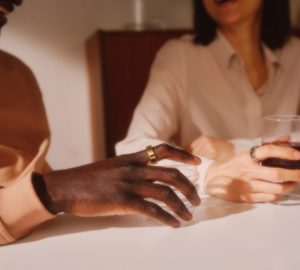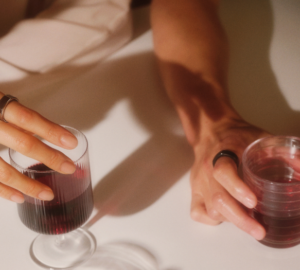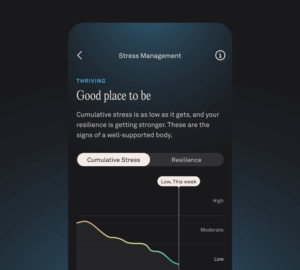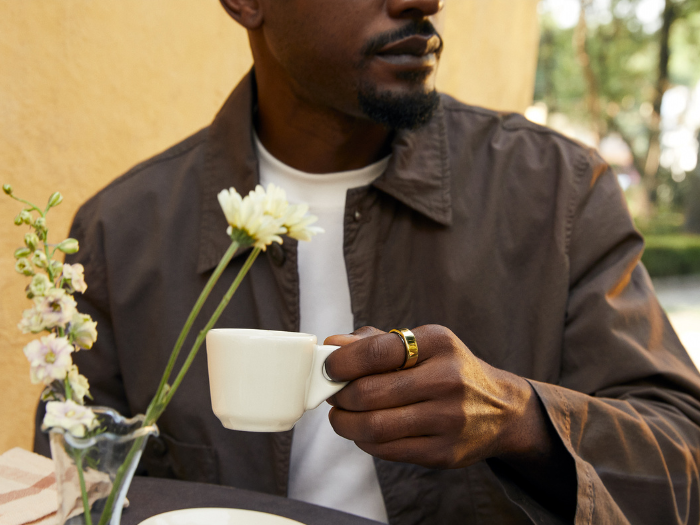With the Daytime Stress feature, Oura members have been empowered to track and understand their physiological stress patterns in more detail. One thing many in our community have realized: Stress during the day is nearly inevitable, and fairly frequent!
But that doesn’t mean all stress is bad. In fact, reframing how you think about stress is one of the goals of the feature. As Sofia Strömmer, PhD, Behavioral Scientist at Oura, says:
“It’s beneficial to be able to see and reflect on what things in life cause physiological stress, or activation, in your body. It allows you to understand when you need to take time to let your body recover — even if the stress comes from something that feels good, like socializing.”
LEARN MORE: Reframing Stress: The Difference Between “Bad” and “Good” Stress
Below, find three (somewhat surprising) findings about when, how, and why Oura members experience stress, based on aggregate data.*
1. When Are Oura Members Most Stressed?
Saturdays emerge as the most stressful day for Oura members, with an average of 113 “stressed” minutes.
Conversely, Mondays bring relief, as stress levels dip to an average of 83 minutes.
If this sounds contradictory to what you’d imagine, you’re not alone. As some members have pointed out on Reddit, they’ve been surprised to stressed moments spike on weekends: “Weekends are full of stress and a workday packed with stressful meetings is a relaxed day. How?” asked one Redditor.
To shed light on this phenomenon, we went to the expert: Emmi Antikainen, Data Scientist at Oura, who works on the Daytime Stress feature. She explains:
“The heightened activity during weekends triggers a physiological stress response, particularly in the sedentary periods following these activities. Additionally, alcohol consumption during weekends is a significant contributor to elevated stress levels.”
In other words, this stress is from external factors that you may not necessarily think of as “stressful:” exercise, alcohol, sauna, or even a big meal. Often, these types of activities are popular on weekends, when people tend to have more free time to play sports, get outside, and gather with friends over drinks.
Remember, your body can’t tell the difference between physiological and psychological stressors. It’s all processed the same, and presents the same in your biometrics, such as increased heart rate and possibly lower heart rate variability.
LEARN MORE: How Does Alcohol Impact Oura Members?
2. How Much Stress & Restorative Time Do Members Have on Average?
On average, Oura members experience 96 “Stressed” minutes each day. They also enjoy 64 “Restored” minutes of stress-free moments daily.
Stressed time, as discussed above, signifies periods of time when your body exhibits signs of stress that are picked up by Oura. This can include a lower-than-usual HRV, faster resting heart rate and higher respiratory rate, as well as lower body temperature trends.
On the other hand, Restorative time signifies when your body is in a relaxed state. Signals for this include limited movement, a lower heart rate, and higher body temperature trends. (The reason? As you relax, more blood is pushed out from your heart to your fingers and toes, so there’s more warm blood circulating there.)
3. How Does Alcohol Play a Role in Members’ Stress?
On days when Oura members tag alcohol:
- 54% had days classified as “Normal”
- 37% had “Stressful” days
- 9% had “Restored” days
Are people having alcohol because they experience stress, or are they stressed because they’re having alcohol? It’s a chicken-and-the-egg conundrum, but either way, we know that alcohol stresses the body, so it shows up as stress spikes in the Oura App.
To manage stress effectively in the long term, it’s important to find healthy strategies that empower you to cope with and recover from stress — sans alcohol. Here are a few ideas:
- Follow a guided breathing exercise or meditation from Oura’s Explore content.
- Get 10 to 15 minutes of morning sunlight, which is a proven way to lower stress.
- Do a few stretches at your desk or in your car to allow your body to relax.
- Try journaling — studies suggest this can help you reframe a stressful moment.
- Replace your evening cocktail with a delicious mocktail with sleep-promoting properties.
RELATED: How to Build Resilience to Stress With a Growth Mindset
*Based on data collected between Sept. 18, 2023 and January 10, 2024. Limited to members with 10+ stress summary days.
About the Oura Experts
Emmi Antikainen is a Data Scientist at Oura, who is currently finishing her PhD in signal processing and machine learning, with a thesis focused on health data analytics. Additionally, she has a master’s degree (MSc) in computational physics. Before joining Oura, she was a research scientist at VTT Technical Research Centre of Finland, developing algorithms for human sensing and health data applications.
Sofia Strömmer, PhD, is a behavioral scientist at Oura. She is from Finland, but lived in the UK for 16 years before moving back to join Oura. She is a Chartered Psychologist and has a PhD in Psychology focusing on the motivational determinants of exercise behavior. Her area of expertise is in motivational aspects of health behavior change and how motivation for health behaviors arises and is maintained. Before joining Oura, Sofia worked as a researcher at the Medical Research Council at the University of Southampton.











